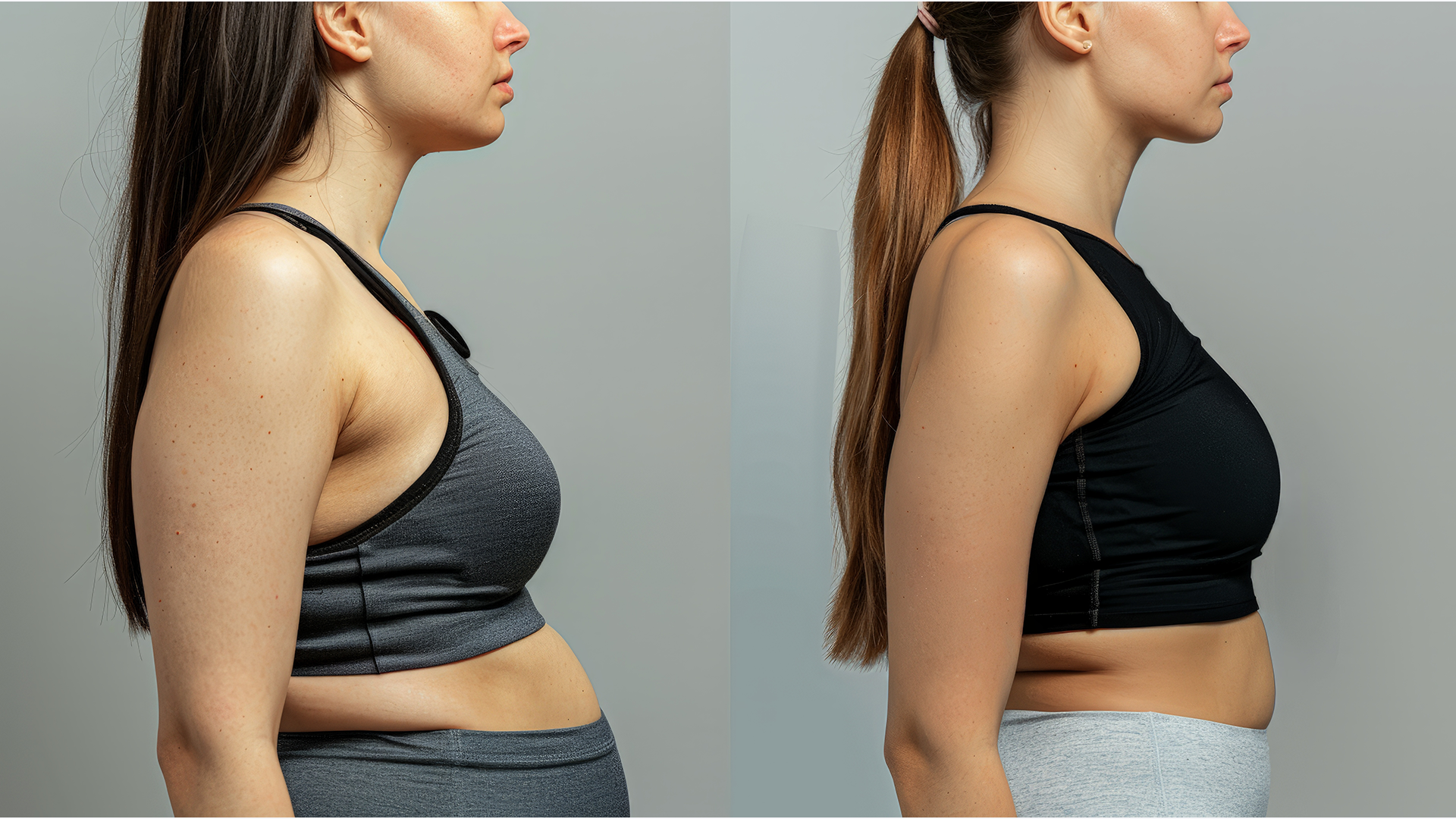Intermittent fasting is one of the world’s most popular diet trends—but is it a healthy way to lose weight—and what are the possible side effects?
If these questions have been whirling around your head for a while, don’t sweat it because we’re here to answer them right now.
Yes, at PhenQ, we’re all about losing weight the healthy way. So, we’re going to give you the lowdown on intermittent fasting side effects before you make any firm diet-altering commitments.
Let’s get into it.
Should you try intermittent fasting for weight loss?

The short answer is…you should try intermittent fasting if you’re in good health and you approach your dieting efforts in a healthy way.
But here’s the caveat: Consuming foods within a specific eating window doesn’t work for everyone. Whatever type of intermittent fasting diet you’re thinking about trying, it's essential to weigh up the potential side effects.
It’s also important to consider whether fasting for set periods will fit around your lifestyle—and if you can keep it up in the long run.
As long as you fuel well within your eating window and take a balanced approach, intermittent fasting is a feasible option. But, by striking the right balance, you can also lose weight sustainably without having to restrict yourself from eating at certain times of the day.
Read: The five best weight loss programs of 2024
What are the side effects of intermittent fasting?

To help you make a decision that works for, well, you—we’re going to explore the main side effects of intermittent fasting right now.
We’ll kick things off with the small matter of…hunger pangs (a.k.a. chronically rumbling stomachs).
Hunger pangs and cravings
While your body can fully adapt to periods of fasting over time, you may experience quite severe hunger pangs and food cravings—especially at the start of your journey.
For some, these pesky pangs and cravings never really go away. And, the more you have to wrangle with them, the more likely (and often) you are to give into binge eating or excessive snacking—which can seriously derail your weight loss efforts.
Read: Psychological hacks to trick your brain into losing more weight
Headaches and lightheadedness

Another common side effect of intermittent fasting is lightheadedness and headaches, especially during those all-important first few days and months.
Commonly known as a ‘fasting headache’, you may experience soreness in the frontal area of the head as your body adjusts to your new regime.
While this won’t be the case for everyone, it’s worth noting that if you’re generally prone to headaches, it’s likely that you’ll experience them during fasting periods.
Fatigue and energy slumps
Not eating for a long period of time can prove challenging for anyone—and if you’re juggling more plates than a clown at a kid’s party—fatigue or energy slumps can make life difficult.
During fasting periods, it’s most uncommon to get extremely tired or wrangle with limbs that are so fatigued they temporarily feel like lead weights.
You can prevent energy slumps and fatigue by getting your nutrition right during your eating windows. But, as we said before, you should only stick with intermittent fasting long term if it genuinely works for you on a daily basis.
Read: How to keep your energy levels up when losing weight
Irritability and unpredictable mood
Ever heard of the phrase “hangry?” Of course, you have. When you restrict your calorie intake over certain periods, it’s not uncommon to suffer from low blood sugar.
When this happens, your concentration can start to dwindle, leading to potential mood swings and irritability. If you experience these kinds of dips in mood regularly, your wellbeing will suffer.
Remember, weight loss is all about loving yourself and meeting milestones at your own pace. If anything gets in the way of that, it’s probably not worth continuing.
Poor sleep patterns

Did you know? Poor quality sleep can slow down your metabolism, making it harder for you to burn calories during the day.
Sleep is not only an essential part of looking after your general wellbeing—but it can also have an impact on the success of your weight loss efforts.
New mealtimes and eating habits can throw off your circadian rhythms which, in turn, can make your sleep broken and restless. Again, this isn’t the case for everyone—but if you find that your intermittent fasting efforts are affecting your sleeping patterns—it might be time to switch things up.
Read: The best nighttime fat burners
Malnutrition
Another pressing intermittent fasting side effect is malnutrition. The fact that you restrict calories during any given fasting period means that when you do eat, getting a balanced fill of nutrients is absolutely essential. There’s no wiggle room here.
If you hit your daily calorie targets while eating meals rich in protein, carbs, and healthy fats—mainly from a vibrant mix of wholefoods—you should achieve your dream body weight while staying healthy.
But, fasting is a fine balancing act. And you must be prepared to do it properly if you want to make this form of weight loss a sustainable part of your lifestyle.
Oh, and fasting has been known to cause bad breath (someone get the mouthwash). Sometimes, this happens due to dehydration. So make sure you drink plenty of water throughout the day.
FYI: For top tips and inside advice on eating well while you're on a weight loss mission, check out our blog’s official Nutrition library.
Are there any long-term intermittent fasting side effects?
When practising intermittent fasting, it’s important to proceed with care and caution.
So, to give you the full lowdown on fasting side effects, here are some of the longer term issues you may experience without a balanced approach to your efforts…
- Eating disorders
- Chronic sleep disturbances
- Organ damage
- Severe electrolyte imbalances
NOTE: These are all potential intermittent fasting side effects and will only present an issue if you don’t get enough nutrition during your eating windows. If you’re unsure whether to give fasting a try, talk to your doctor or a healthcare professional.
The potential health benefits of intermittent fasting explained

We’ve talked about intermittent fasting side effects—but what about the health benefits?
If you take on intermittent fasting with the aim of losing weight sustainability (rather than treating it as a crash diet), here are the possible perks you may enjoy…
- Sustained weight loss
- A better metabolism
- Reduced risk of chronic diseases
- Enhanced brain function and focus
- Cellular repair
- Reduced inflammation
- Hormone regulation
- Increased lifespan
We may sound like a broken record at this point, but it’s worth saying (again) that the results of intermittent fasting are different for everyone. Oh, and to reap these health benefits, you have to get your efforts right—leave the crash dieting mindset at the door.
Read: Our guide to 16/8 intermittent fasting
How to get intermittent fasting for weight loss right: Our golden rules

To reap the rewards of intermittent fasting for weight loss, stay healthy, and feel good—here are some golden rules you should follow…
- Choose the right fasting method for you: Go with a fasting method that suits your lifestyle and goals. There are plenty out there to choose from, so think about your personal needs and take your pick.
- Eat well, every day: Focus on whole, unprocessed foods during your eating window to get your fill of calories and nutrients.
- Stay hydrated: Drink plenty of water throughout the day, especially during fasting periods. It’s the best way to keep your energy levels up, keep your system efficient, and feel good.
- Listen to your body: Pay attention to hunger and fullness cues. Avoid overeating during your eating window and don’t be afraid to switch things up if your fasting routine is making you feel drained or sluggish.
- Start slow. Build up: Start with shorter fasting periods and gradually increase them as your body adapts. That way, you’ll be more likely to stick at it without batting off constant hunger pangs.
- Move a little: Regular exercise or physical activity can enhance the benefits of intermittent fasting. You don’t have to climb mountains or run marathons, a spritely stroll everyday will do.
- Talk to your doctor: Seek advice from a healthcare provider before starting any kind of new diet, especially if you have any underlying health conditions. It’s the smart thing to do.
Read: Fasted cardio benefits
Reach your weight loss goals with PhenQ

Now that you know the potential intermittent side effects you may face and how to tackle this popular weight loss method with a balanced approach—the choice is yours.
While you can lose weight consistently and enjoy certain health benefits with fasting diets, they’re not the be all and end all.
Shedding the pounds is all about patience, consistency, and doing what’s right for your body. Armed with the right knowledge, you can choose your own path when it comes to weight loss—and strike the kind of balance that offers real long-term results.
At PhenQ, we exist to empower weight loss warriors to reach their goals the right way. We have the products and the insider advice to get you where you need to be.
Check out our official blogs to connect with all of the support, tips, and knowledge you need to succeed. We’re with you every step of the way.
Your body-boosting FAQs
What is the best intermittent fasting schedule for weight loss?
The best intermittent fasting plan for you depends on what works with your lifestyle. Remember, it’s all about you.
Popular fasting options include the 16/8 (eating for eight hours, fasting for 16), the 5:2 (eating normally for five days, restricting calories for two days), or one big meal a day. Remember, it's always a good idea to talk to your doctor before starting any new diet.
How much weight can you lose with intermittent fasting?
You can lose an average of between 2kg and 6kg a month with intermittent fasting. But, your exact weight loss results will depend on which fasting diet you choose, your current weight or fitness level, and your ability to stick to your chosen plan in a healthy, balanced way.



